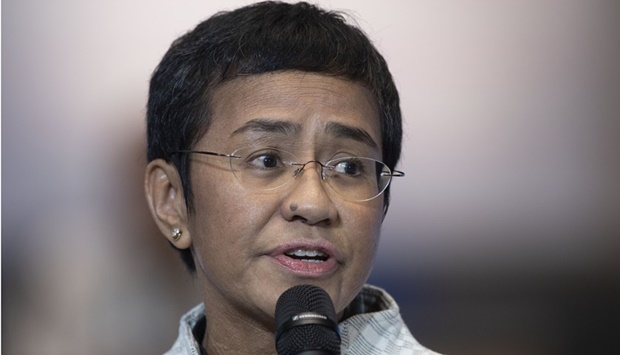Philippine Nobel Peace Prize winner Maria Ressa's news company Rappler was ordered Wednesday to shut down, a day before President Rodrigo Duterte is due to leave office, but she vowed to keep the site running.
Ressa has been a vocal critic of Duterte and the deadly drug war he launched in 2016, triggering what media advocates say is a grinding series of criminal charges, probes and online attacks against her and Rappler.
The latest blow was delivered by the Philippine Securities and Exchange Commission.
In a statement Wednesday, it confirmed the "revocation of the certificates of incorporation" of Rappler for violating "constitutional and statutory restrictions on foreign ownership in mass media".
Rappler said the decision "effectively confirmed the shutdown" of the company and vowed to appeal, describing the proceedings as "highly irregular".
But Ressa was characteristically defiant, vowing the news site would continue to operate as they followed the legal process.
"We continue to work, it is business as usual," Ressa told reporters, adding "we can only hope for the best" under Duterte's successor Ferdinand Marcos Jr.
Marcos Jr, the son of the Philippines' former dictator who presided over widespread human rights abuses and corruption, takes over from Duterte on Thursday.
Activists fear Marcos Jr's presidency could worsen the situation for human rights and freedom of speech in the country.
- 'Retaliation' -
Rappler has had to fight for survival as Duterte's government accused it of violating a constitutional ban on foreign ownership in securing funding, as well as tax evasion.
It has also been accused of cyber libel -- a new criminal law introduced in 2012, the same year Rappler was founded.
Duterte has attacked the website by name, calling it a "fake news outlet", over a story about one of his closest aides.
The news organisation is accused of allowing foreigners to take control of its website through its parent company Rappler Holdings' issuance of "depositary receipts".
Under the constitution, investment in media is reserved for Filipinos or Filipino-controlled entities.
The case springs from a 2015 investment from the US-based Omidyar Network, which was established by eBay founder Pierre Omidyar.
Omidyar Network later transferred its investment in Rappler to the site's local managers to stave off efforts by Duterte to shut it down.
Ressa, who is also a US citizen, and Russian journalist Dmitry Muratov were awarded the Nobel Peace Prize in October for their efforts to "safeguard freedom of expression".
Ressa is fighting at least seven court cases, including an appeal against a conviction in a cyber libel case, for which she is on bail and faces up to six years in prison.
Rappler faces about eight cases, Ressa said.
- 'Legal harassment' -
Human Rights Watch said the website was facing "retaliation for its fearless reporting".
The International Center For Journalists (ICFJ) urged the Philippine government to reverse its order to shut down Rappler.
"This legal harassment not only costs Rappler time, money and energy. It enables relentless and prolific online violence designed to chill independent reporting," ICFJ said on Twitter.
The future of Rappler and its battle in the country's highly politicised legal system under Marcos Jr's presidency is uncertain.
The president-elect has given few clues about his views on the website and the broader issue of freedom of speech.
He has largely shunned media interviews and press conferences, preferring to communicate via his press secretary and through social media.
US Second Gentleman Douglas Emhoff, who is heading a delegation to the Philippines for Marcos Jr's inauguration, would not comment on the Rappler case.
He told reporters in Manila that the US administration had a "deep commitment towards freedom of speech, freedom of expression, human rights".

